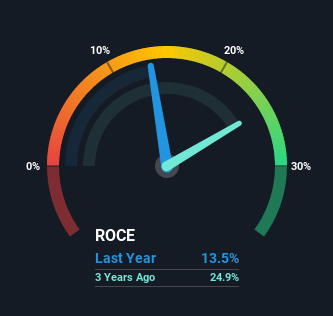Returns On Capital Signal Tricky Times Ahead For SoftTech Engineers (NSE:SOFTTECH)
If we want to find a stock that could multiply over the long term, what are the underlying trends we should look for? Ideally, a business will show two trends; firstly a growing return on capital employed (ROCE) and secondly, an increasing amount of capital employed. If you see this, it typically means it's a company with a great business model and plenty of profitable reinvestment opportunities. Having said that, from a first glance at SoftTech Engineers (NSE:SOFTTECH) we aren't jumping out of our chairs at how returns are trending, but let's have a deeper look.
What is Return On Capital Employed (ROCE)?
Just to clarify if you're unsure, ROCE is a metric for evaluating how much pre-tax income (in percentage terms) a company earns on the capital invested in its business. To calculate this metric for SoftTech Engineers, this is the formula:
Return on Capital Employed = Earnings Before Interest and Tax (EBIT) ÷ (Total Assets - Current Liabilities)
0.13 = ₹118m ÷ (₹1.1b - ₹204m) (Based on the trailing twelve months to September 2020).
So, SoftTech Engineers has an ROCE of 13%. That's a relatively normal return on capital, and it's around the 14% generated by the Software industry.
Check out our latest analysis for SoftTech Engineers

Historical performance is a great place to start when researching a stock so above you can see the gauge for SoftTech Engineers' ROCE against it's prior returns. If you'd like to look at how SoftTech Engineers has performed in the past in other metrics, you can view this free graph of past earnings, revenue and cash flow.
What Can We Tell From SoftTech Engineers' ROCE Trend?
Unfortunately, the trend isn't great with ROCE falling from 18% five years ago, while capital employed has grown 167%. That being said, SoftTech Engineers raised some capital prior to their latest results being released, so that could partly explain the increase in capital employed. It's unlikely that all of the funds raised have been put to work yet, so as a consequence SoftTech Engineers might not have received a full period of earnings contribution from it.
On a related note, SoftTech Engineers has decreased its current liabilities to 19% of total assets. So we could link some of this to the decrease in ROCE. Effectively this means their suppliers or short-term creditors are funding less of the business, which reduces some elements of risk. Some would claim this reduces the business' efficiency at generating ROCE since it is now funding more of the operations with its own money.
What We Can Learn From SoftTech Engineers' ROCE
From the above analysis, we find it rather worrisome that returns on capital and sales for SoftTech Engineers have fallen, meanwhile the business is employing more capital than it was five years ago. In spite of that, the stock has delivered a 11% return to shareholders who held over the last three years. Either way, we aren't huge fans of the current trends and so with that we think you might find better investments elsewhere.
If you want to know some of the risks facing SoftTech Engineers we've found 3 warning signs (2 are concerning!) that you should be aware of before investing here.
If you want to search for solid companies with great earnings, check out this free list of companies with good balance sheets and impressive returns on equity.
If you decide to trade SoftTech Engineers, use the lowest-cost* platform that is rated #1 Overall by Barron’s, Interactive Brokers. Trade stocks, options, futures, forex, bonds and funds on 135 markets, all from a single integrated account. Promoted
The New Payments ETF Is Live on NASDAQ:
Money is moving to real-time rails, and a newly listed ETF now gives investors direct exposure. Fast settlement. Institutional custody. Simple access.
Explore how this launch could reshape portfolios
Sponsored ContentNew: Manage All Your Stock Portfolios in One Place
We've created the ultimate portfolio companion for stock investors, and it's free.
• Connect an unlimited number of Portfolios and see your total in one currency
• Be alerted to new Warning Signs or Risks via email or mobile
• Track the Fair Value of your stocks
This article by Simply Wall St is general in nature. It does not constitute a recommendation to buy or sell any stock, and does not take account of your objectives, or your financial situation. We aim to bring you long-term focused analysis driven by fundamental data. Note that our analysis may not factor in the latest price-sensitive company announcements or qualitative material. Simply Wall St has no position in any stocks mentioned.
*Interactive Brokers Rated Lowest Cost Broker by StockBrokers.com Annual Online Review 2020
Have feedback on this article? Concerned about the content? Get in touch with us directly. Alternatively, email editorial-team (at) simplywallst.com.
About NSEI:SOFTTECH
SoftTech Engineers
Develops software products and solutions for the architecture, engineering, operations, and construction sectors in India and internationally.
Excellent balance sheet with low risk.
Similar Companies
Market Insights
Weekly Picks

THE KINGDOM OF BROWN GOODS: WHY MGPI IS BEING CRUSHED BY INVENTORY & PRIMED FOR RESURRECTION


Why Vertical Aerospace (NYSE: EVTL) is Worth Possibly Over 13x its Current Price


The Quiet Giant That Became AI’s Power Grid
Recently Updated Narratives

Jackson Financial Stock: When Insurance Math Meets a Shifting Claims Landscape

Stride Stock: Online Education Finds Its Second Act

CS Disco Stock: Legal AI Is Moving From Efficiency Tool to Competitive Necessity
Popular Narratives


MicroVision will explode future revenue by 380.37% with a vision towards success


Crazy Undervalued 42 Baggers Silver Play (Active & Running Mine)





